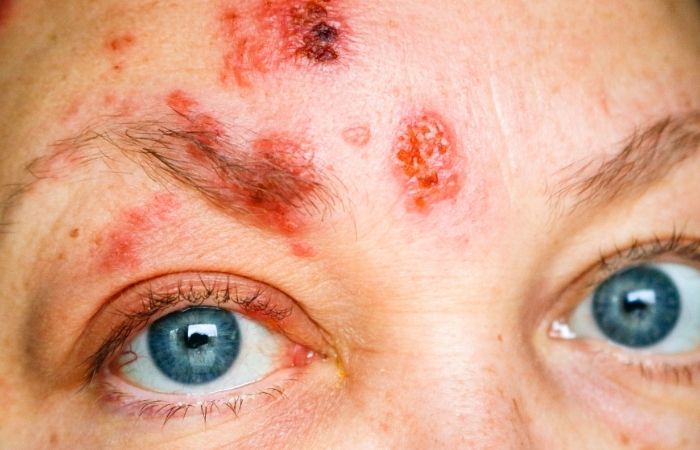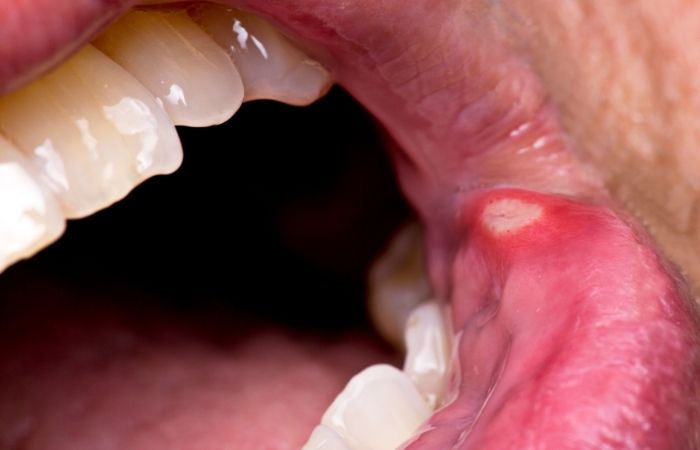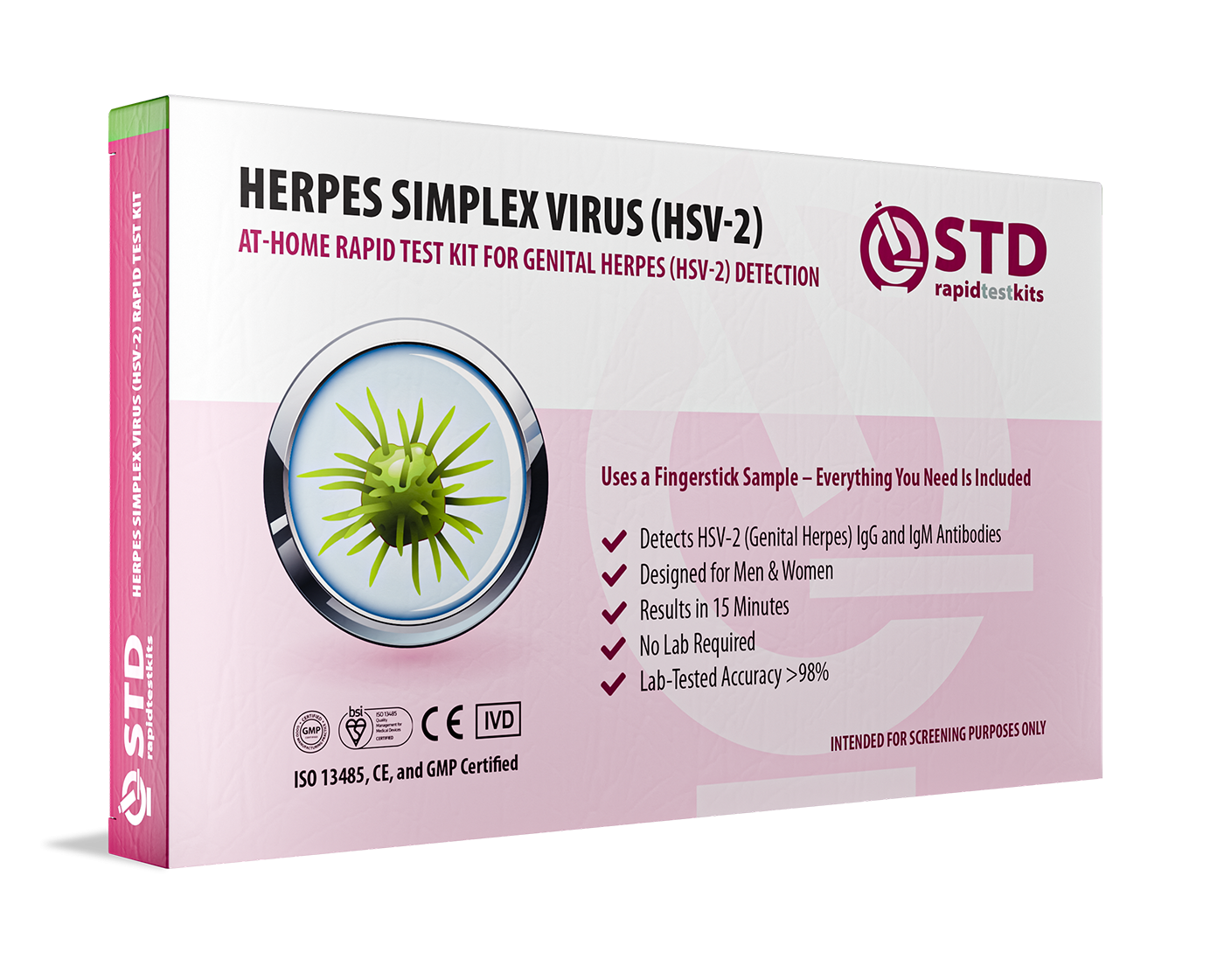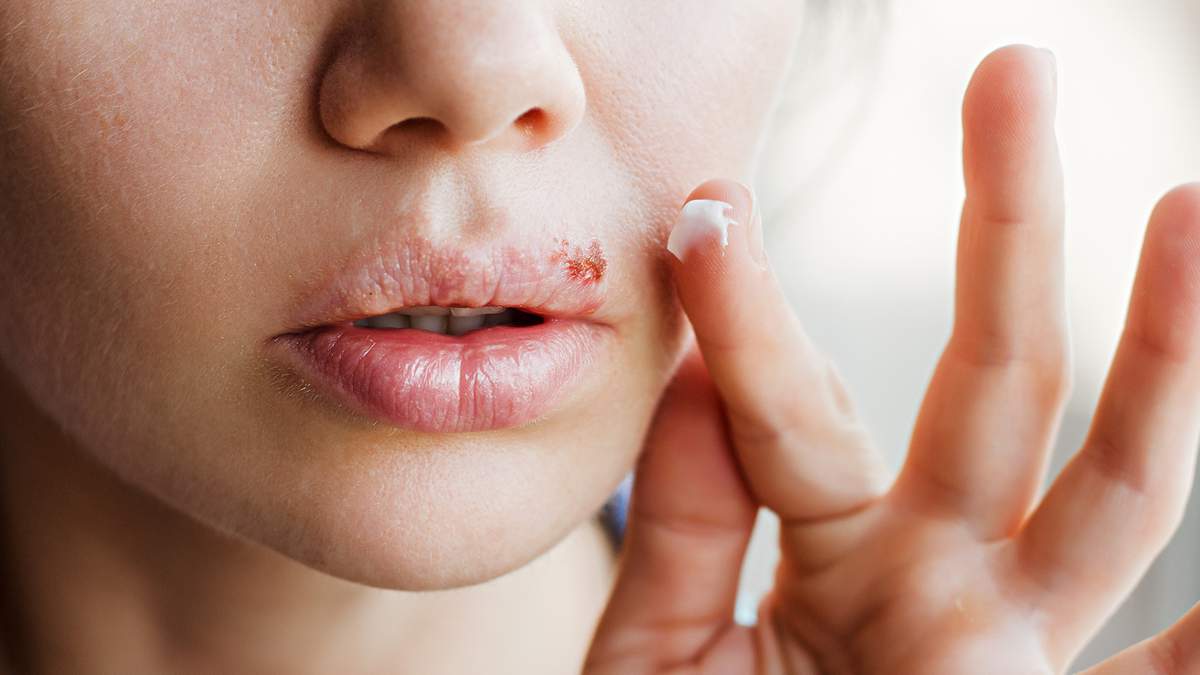Quick Answer: Herpes is an incredibly common viral infection caused by herpes simplex virus, either HSV‑1 (often oral) or HSV‑2 (most often genital). It spreads through skin-to-skin or mucosal contact, including kissing or sexual activity. Most people live with it silently, and while it's incurable, it’s manageable, treatable, and not a reflection of your worth.
HSV‑1 vs HSV‑2: Not All Herpes Is the Same
Herpes simplex virus comes in two main forms: HSV‑1 typically causes oral sores (cold sores), though it can infect the genitals. HSV‑2 more commonly affects the genital area, but either type can appear in either location. Both strains establish lifelong residency in nerve cells and may reactivate as outbreaks, but many carriers never have noticeable symptoms and live full, healthy lives.

People are also reading: Is My Rash a Cold Sore?
How Herpes Spreads: More Than Sex
Transmission happens through direct contact, skin-to-skin or mucosal. That includes kissing, oral-genital contact, and penetrative sex. Condoms and barriers help, but don’t eliminate the risk entirely, especially in waterproof areas like the mouth or thighs. Crucially, viral shedding can occur even when no sores are visible, making herpes possible even with no symptoms.
Recognizing Symptoms, or Not
Many people think herpes always looks obvious, but in reality, symptoms vary widely. The classic outbreak includes tingling or itching followed by blister clusters, ulcers, and scabbing. But many people have mild symptoms misdiagnosed as ingrown hairs, yeast infections, or allergic rashes. Some people never have visible symptoms yet can still transmit the virus.
Testing Options & Timing
To confirm herpes, a swab test (PCR) is best during outbreaks. Blood (IgG) tests detect whether you’ve been exposed in the past, though antibodies may take 4–12 weeks to appear. Testing too early or during silent periods may yield false negatives, which is why timing matters. Testing gives clarity, not shame.
Check Your STD Status in Minutes
Test at Home with RemediumGenital & Oral Herpes Test Kit

 For Men & Women
For Men & Women Results in Minutes
Results in Minutes No Lab Needed
No Lab Needed Private & Discreet
Private & DiscreetOrder Now $75.00 $98.00
For all 2 tests
What Triggers Herpes Outbreaks?
After the initial infection, herpes can lie dormant in your nervous system for weeks, months, or even years. Then something, stress, illness, hormonal changes, sunburn, or even friction, can trigger a reactivation. The virus travels along nerve paths to the skin, causing an outbreak at or near the original site. The first outbreak is usually the most severe; later ones tend to be milder and shorter.
Some people learn to recognize the early signs: tingling, itching, or tenderness in the skin before sores appear. Others may feel flu-like symptoms during the initial outbreak, especially with HSV‑2: fever, body aches, swollen lymph nodes, and painful urination.
Is Herpes Curable? Here’s What You Need to Know
No, herpes isn’t curable. But it’s manageable. Antiviral medications like valacyclovir (Valtrex) or acyclovir can reduce the length and severity of outbreaks and lower the chances of spreading the virus. Some people take them only when symptoms flare up (episodic therapy), while others use them daily (suppressive therapy) to prevent frequent outbreaks or protect a partner.
Good news? Outbreaks often become less frequent over time. And for many, the virus becomes just a background detail in a full, normal sex life.
What It Means to “Have Herpes” Emotionally
Herpes doesn’t just affect the skin, it messes with the psyche. People often experience intense shame, fear of rejection, or feel "broken." But here’s the truth: having herpes doesn’t make you dirty, dangerous, or undeserving of love. It means you had skin contact with someone else. That’s it. The stigma is much more damaging than the virus itself.
In reality, most partners are understanding, especially when you communicate with honesty and confidence. You’re not the first person to bring it up, and you won’t be the last.

Talking to a Partner About Herpes
This is where things feel scariest, but they don’t have to be. Disclosing herpes can be awkward, sure. But many people find that honesty actually builds intimacy, trust, and stronger communication. Here’s how to start:
- Pick a good moment: Not during sex, not while drinking. Choose a private, calm space.
- Lead with facts: “Herpes is super common, and most people have it and don’t know. I’ve tested positive for HSV‑1/2.”
- Reframe the narrative: You’re not confessing, you’re informing. And protecting.
- Offer support: “I use antivirals and haven’t had an outbreak in months. I’d never want to put you at risk without you knowing.”
You don’t need to apologize for being honest. This is what sexual maturity looks like.
Herpes and Pregnancy: What Parents Should Know
If you’re pregnant or planning to be, herpes can raise new questions. Most of the time, having HSV doesn’t cause complications. But active genital herpes during labor can pose a risk of transmitting the virus to the baby (called neonatal herpes), which is rare but serious. That’s why disclosure matters, to you, your doctor, and your baby’s future.
If you have a history of genital herpes, your OB-GYN might recommend daily antiviral medication during the final weeks of pregnancy to suppress any possible outbreak. If sores are present during labor, a cesarean delivery may be suggested to reduce risk. Communication with your provider is key, and herpes doesn’t disqualify you from a safe, healthy birth.
Herpes Doesn't Go Alone: Risk of Getting Other Infections
One of the less well-known facts about herpes is that It can make you more likely to get other STDs, especially HIV. Herpes sores weaken the skin and mucous membranes, which makes it easier for viruses like HIV to get into the blood. Also, it's not uncommon for people who don't get tested often to have chlamydia, gonorrhea, orsyphilis at the same time.
This is why comprehensive testing matters. If you've had an outbreak, or your partner has, don’t just test for herpes. Screen for the full panel of STDs, and make it a regular habit if you're sexually active.
Check Your STD Status in Minutes
Test at Home with RemediumGenital Herpes Test Kit

 For Men & Women
For Men & Women Results in Minutes
Results in Minutes No Lab Needed
No Lab Needed Private & Discreet
Private & DiscreetOrder Now $45.99 $49.00
Busting the Biggest Herpes Myths
Let’s clear the air:
Myth: Only "promiscuous" people get herpes.
Fact: Herpes affects people in long-term, monogamous, even virgin relationships. Skin contact is enough.
Myth: You’ll always know if you have herpes.
Fact: The majority of people with herpes don’t have noticeable symptoms, or mistake them for something else.
Myth: You can’t have a healthy sex life with herpes.
Fact: You absolutely can, with honesty, antiviral treatment, and sometimes protection.
Myth: Herpes is rare.
Fact: Over 3.7 billion people worldwide have HSV‑1 or HSV‑2. That’s nearly half the global population.
Shame thrives in silence. Information destroys it.
Less Talked‑About Symptoms: When Herpes Doesn’t Present Traditionally
Herpes isn't always a big deal. A lot of people never get blisters. Some smaller, less obvious signs are a tingling feeling in the cheek, a little pain in the nose, or even a sore throat. Some people feel mild irritation in the rectum or vagina without any fluid. These non-classic symptoms often make people put off getting tested or blame the problem on something else. You can spot early signs of an outbreak before it gets worse if you know your baseline, itch, mood, and stress levels.
Why the timing of herpes outbreaks varies
Your immune system has a big effect on how herpes spreads. Outbreaks happen less often when you have strong immunity and more often when you are sick, don't get enough sleep, or your hormones change. That means taking care of your stress, diet, and sleep is not just self-care; it's part of your treatment. Low-threshold antiviral suppressive therapy can help with frequent outbreaks, but the best way to protect yourself is still to boost your immune system.

People are also reading: I Got Ghosted After a Hookup, Then I Tested Positive for Chlamydia
Unexpected Benefits: When Herpes Opens Conversations (Not Walls)
Getting diagnosed with herpes or telling someone about it often makes people feel better about themselves and their relationships. A lot of people feel better when they can talk openly about herpes. It lowers partner anxiety, encourages both partners to get tested for STDs, and shows what consent culture looks like. If you handle it with clarity and purpose, what starts as stigma can turn into self-advocacy and communication that makes intimacy stronger.
How to Date with Herpes: Tell Your Partner Without Apologizing
When you tell a possible partner that you have herpes, it can be the scariest thing in modern dating, but it doesn't have to be. The truth is that being honest will help you get rid of people who aren't safe or respectful. That's a victory. How you frame it is the key. Herpes isn't a moral failing; it's a skin condition that can be treated. Take the facts: “It's very common, it's treatable, and I'm telling you because I think you have the right to know.” Most people react better than we think they will. And what if they don't? They weren't meant for you.
Mental Health and Herpes: Breaking the Shame Spiral
The mental spiral is one of the worst things about herpes, not the physical outbreaks. The shame. The worry of being turned down. The stories we've told ourselves about being "unclean" or "unwanted." But those scripts aren't true; they're based on stigma, wrong information, and not talking about it. Therapy is helpful. Reading about real people who have been through the same thing also helps. So does saying, "This doesn't change who I am."
Your mental health deserves as much care as your skin. If herpes is making you feel depressed, isolated, or anxious, you’re not alone, and you're not weak. There’s nothing irrational about reacting to stigma. But there’s healing in naming it, dismantling it, and refusing to carry it alone. Your story didn’t end with a diagnosis. It’s still yours to write, one brave choice at a time.
Check Your STD Status in Minutes
Test at Home with RemediumOral Herpes Test Kit

 For Men & Women
For Men & Women Results in Minutes
Results in Minutes No Lab Needed
No Lab Needed Private & Discreet
Private & DiscreetOrder Now $33.99 $49.00
At-Home Herpes Testing: Safe, Smart, and Private
You don’t need to visit a clinic to get clarity. Today’s at-home herpes test kits offer lab-accurate results for HSV‑1 and HSV‑2. These tests typically require a small blood sample (finger prick) that you send to a certified lab, with results available online in a few days. No waiting rooms, no awkward questions, no unwanted surprises on your insurance bill.
Order a kit here and take control without the stress.
FAQs
Questions and Answers
1. Can herpes go away by itself?
No. The herpes virus stays in your body for life. The virus stays in your body forever, even when outbreaks happen.
2. How often do people get herpes?
Very much so. The World Health Organization says that more than 3.7 billion people under 50 have HSV-1 and more than 490 million have HSV-2.
3. Is it possible to have herpes and not know it?
Yes. A lot of people don't have any symptoms or think they have them when they really have a pimple or razor burn.
4. Is it possible to get herpes from oral sex?
Yes, of course. HSV-1 is often spread through oral-genital contact, even if there are no sores.
5. Is there a way to get rid of herpes?
There is no cure yet, but antiviral drugs make it easier to live with herpes and lower the risk of spreading it.
6. Do condoms completely protect against herpes?
No, but they do lower the risk. Herpes can spread through skin-to-skin contact in places where a condom doesn't cover.
7. Should I tell my boyfriend or girlfriend that I have herpes?
Yes. Honest disclosure lets people give informed consent and helps stop the spread of the disease. Many partners respond with empathy.
8. Can herpes make it hard to get pregnant?
Not directly. Herpes doesn't usually affect fertility like some STDs do, but if you have herpes while pregnant, you need to see a doctor.
9. How does an outbreak of herpes feel?
Before sores show up, you may feel itching, burning, tingling, or pain. Sores can get worse and turn into ulcers, which then crust over.
10. Where can I get tested for herpes at home?
STD Rapid Test Kits offers discreet, lab-certified herpes testing you can do from home, no clinic, no ID, no insurance required.
You Are Not a Diagnosis
Let’s be honest, herpes can feel like a slap in the face. A simple word that triggers shame, panic, or isolation. But here’s what’s more true than any fear you’ve been handed: you are not your virus. You’re not "damaged goods." You’re a human being navigating skin contact, intimacy, and all the messiness that comes with being alive. And you are still worthy of love, pleasure, and peace of mind.
Knowledge is power, testing is strength, and honesty is healing. Whether you’re managing herpes now or just learning what it means, the most powerful thing you can do is stay informed. Test when you need to. Disclose with confidence. And treat yourself like someone who deserves softness, even when your skin doesn’t feel that way.
Sources
2. Creating Innovative STI Self-testing Programs: University Health Center Case Study
4. Screening for STIs at Home or in the Clinic? Feasibility of Home STI Screening
5. Systematic Review – New Approaches to STI Testing (Self-Collection Saves Time & Boosts Diagnoses)










